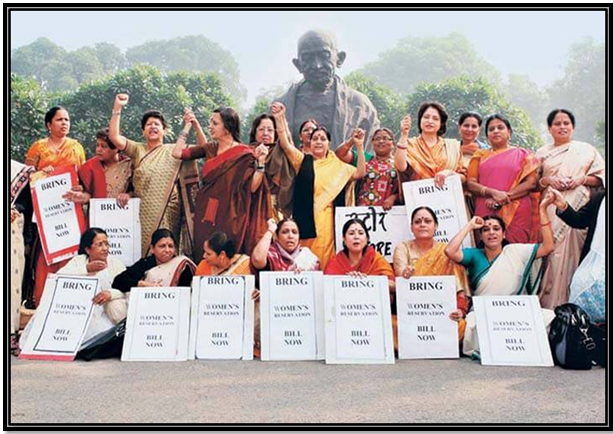ON POLITICAL REPRESENTATION OF WOMEN IN INDIA
Source: youthkiawaz.com
Relevance:
- GS 2: Role of Women and Women’s Organizations, Population and Associated Issues, Poverty and Developmental Issues, Social Sector/Services related to Health, Education, Human Resources.
- Ethics: The discussion on gender equality in politics relates to ethical perspectives on justice, equality, and inclusiveness.
Why in the News?
- Recent electoral outcomes in countries like the UK and South Africa have reignited discussions on women’s political representation.
- India’s 17th Lok Sabha has the highest number of women MPs since independence, yet they only constitute 14% of the total.
Current Scenario:
- Globally, countries such as the UK, South Africa, and the USA show varying levels of women’s representation in their legislative bodies.
- Despite having the highest number of women MPs in the 17th Lok Sabha, India still lags with only 14% representation.
Importance of Women’s Representation:
- Women’s participation in politics is essential for inclusive governance and addressing gender-specific issues.
- Greater representation ensures diverse perspectives and equitable policy-making, aiding overall societal development.
Challenges to Women’s Political Participation:
- The Women’s Reservation Bill, which aims to reserve 33% of seats in Parliament and State Assemblies for women, has faced significant opposition and delays.
- Critics argue that reservations may lead to tokenism, and merit should be the sole criterion for political roles.
Voluntary or Legislated Quotas within Political Parties:
- Some political parties have begun providing internal reservations to boost women’s political participation. For instance, Trinamool Congress and Biju Janata Dal have nominated a higher percentage of women candidates.
- However, these voluntary measures are inconsistent across parties and often lack the force of law for nationwide implementation.
| Global Case Studies:
Rwanda:
Sweden:
Mexico:
South Africa:
India:
Potential Impact: Implementing the Women’s Reservation Bill could lead to significant improvements in gender equality, policy-making, and inclusive governance. |
Implications of Increased Women’s Representation:
- Better Governance: More women in politics lead to more inclusive and comprehensive governance. Women are likely to address health, education, and welfare issues, benefiting society overall.
- Economic Development: Countries with higher gender equality in politics often see better economic growth. Women’s participation can result in more balanced and sustainable economic policies.
- Social Justice: Ensuring women’s political representation advances social justice and equality. It empowers women and fosters inclusive decision-making.
The Way Forward:
- Legislative Action: Implementing the 108th Constitutional Amendment, which proposes a 33% reservation for women in Parliament and State Assemblies, is essential.
- Political Will: Strong political commitment from all parties is needed to pass and implement the Women’s Reservation Bill.
- Grassroots Efforts: Encouraging women’s participation in local governance can build a foundation for higher political involvement.
- Awareness and Education: Promoting awareness of the importance of women’s representation and providing education and training to potential women leaders can bridge the gender gap in politics.
Support Systems for Women in Politics:
- Mentorship Programs: Establishing mentorship programs where experienced female politicians support newcomers can build confidence and competence among aspiring women leaders.
- Financial Support: Providing financial assistance and resources for women candidates can reduce economic barriers that often prevent women from running for office.
- Safe Political Environment: Ensuring a safe and supportive political environment free from harassment and discrimination is crucial for encouraging more women to participate in politics.
Role of Civil Society and Media:
- Civil Society Organizations: NGOs and civil society organizations can advocate for women’s representation and support female candidates through training and resources.
- Media Representation: Positive media portrayal of women politicians and highlighting their achievements can change societal attitudes and encourage more women to pursue political careers.
Conclusion:
Increasing women’s political representation enriches the democratic process with diverse perspectives and experiences. Legislative measures, political will, and grassroots efforts are needed to ensure women have equitable opportunities to participate in governance, leading to more inclusive and effective governance.
Mains Question:
Discuss the significance of political representation for women in India. What measures can be taken to enhance their participation in the political process? (250 words)
Source: The Hindu

 Source: youthkiawaz.com
Source: youthkiawaz.com

